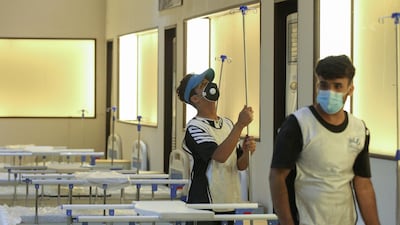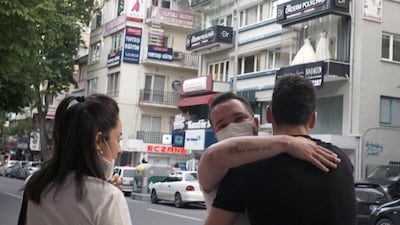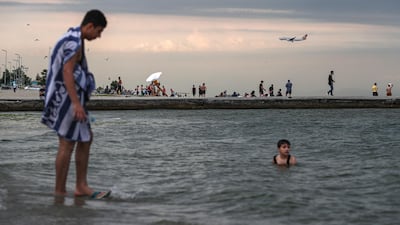Dozens of protesters called for the freedom of Lebanese activist Kinda Al Khatib outside Beirut’s Military Court on Monday, shortly before a judge charged her with collaborating with Lebanon’s long-time antagonist, Israel.
Several members of her family told The National they believed that Ms Al Khatib was arrested because she was a vocal critic of Lebanese party Hezbollah and its ally, President Michel Aoun, on Twitter, where she has about 30,000 followers.
“In Lebanon, there is oppression against freedom and freedom of expression,” said one of her sisters, Mariam Al Khatib. “She was threatened on Twitter before her arrest. People told her to shut up.”
Lebanese authorities accused Ms Al Khatib of illegally crossing into Israel during a visit to Jordan earlier this year, according to her family, who denied that she had left the capital, Amman.
“She visited Jordan as a tourist in early 2020 and they took this as a pretext to say that she collaborated with the Zionist enemy,” said Mariam Al Khatib.
Lebanon and Israel are in a state of war and each country bans its citizens from visiting the other.
On Monday, the state-run National News Agency said that government commissioner to the military court judge Fadi Akiki charged Kinda Al Khatib with visiting Israel and “dealing with spies of the Israeli enemy”.
Judge Akiki referred her case to military investigative judge Fadi Sawan and asked him to interrogate her and issue an arrest warrant.
The military court was not available for comment.
Under heavy security surveillance, including riot police, protesters marched past the court, chanting “revolution” and holding banners asking for the release of Ms Al Khatib.
The 23-year old is a masters’ student in English and translation at the Lebanese University in Beirut. She also works as an English teacher in a private institute.
The family said Ms Al Khatib was arrested at 6.30am on Thursday with her brother Bandar, who was also accused of collaborating with Israel, in the family house near the town of Halba, in the northern region of Akkar.
Bandar Al Khatib, a retired soldier who said he was not active on social media, was released two days later.
“That is the paradox,” said sister Mariam. “They let him go and kept her because she is an activist.”
The family has not been allowed to contact Ms Al Khatib since her arrest.
“We said we didn’t leave [Amman], and they said ‘no, you went to the Dead Sea [on the Israeli border]’. They asked me if I left her alone sometimes, I said I only left her in malls, and they said ‘that’s when she left’” for Israel, said Mr Al Khatib.
The brother and sister were also asked if they financed anti-government protests, which started last October because of economic grievances. The region of Akkar, one of the most disenfranchised in Lebanon, has become a hotspot for the demonstrations.
“They asked us if we received money to finance the [anti-government] movement,” said Mr Al Khatib. “We said we took no money for anything.”
The family strongly agreed with the protests, he said.
“We all support the movement. We support the idea that there should be no weapons outside those of the army,” he said, in reference to Hezbollah’s weapons.
The Iran-backed group is the only Lebanese party that did not disarm after the end of the Lebanese civil war in 1990 in the name of the fight against Israel, against which it fought a month-long war in 2006.
Supporters of Ms Al Khatib said they believed that her case was similar to that of actor Ziad Itani, who was released in 2018 after being cleared of charges of collaborating with Israel.
Itani spent about four months in prison and told human rights organisations that he was tortured.
“We are afraid that Kinda will be Ziad Itani number two,” said Mr Al Khatib.
Neither he nor his sister were physically harmed during their detention, he said.













